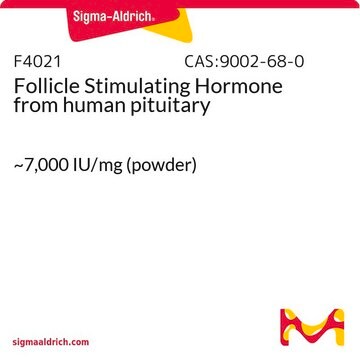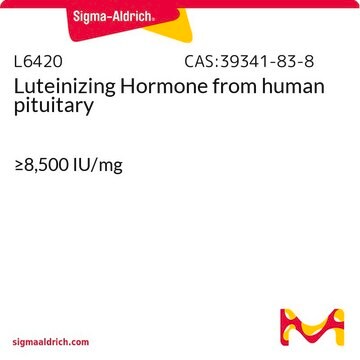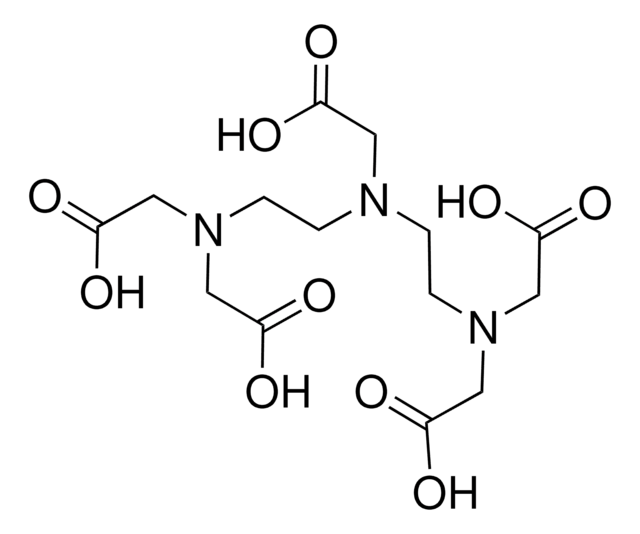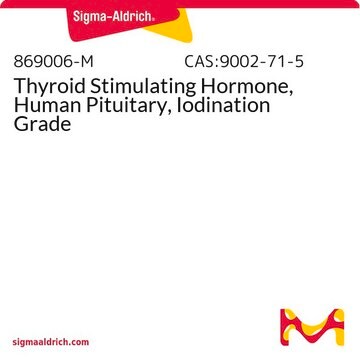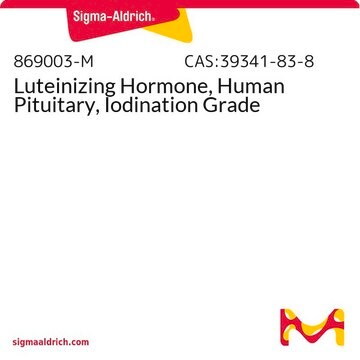869001-M
Follicle Stimulating Hormone, Human Pituitary, Iodination Grade
Follicle Stimulating Hormone, Human Pituitary, Iodination Grade, CAS 9002-68-0, is a native pituitary protein that regulates Sertoli cells by acting on G-protein-linked cell surface FSH receptors.
Synonym(s):
Follicle Stimulating Hormone, Human Pituitary, Iodination Grade, Follitropin, hFSH
Sign Into View Organizational & Contract Pricing
All Photos(1)
About This Item
Recommended Products
biological source
human pituitary glands
Quality Level
sterility
non-sterile
product line
Calbiochem®
Assay
≥90%
form
lyophilized solid
specific activity
≥2000 IU/mg
manufacturer/tradename
Calbiochem®
storage condition
OK to freeze
impurities
≤0.1% hCG
≤0.5% hLH, hTSH
pI
4.1
solubility
PBS: soluble
storage temp.
−20°C
General description
Follicle-stimulating hormone (FSH) belongs to the family of glycoprotein hormones. It is synthesized in the gonadotrophs present in the pituitary gland. FSH contains non-covalently associated α- and β-subunits and is a disulfide-rich heterodimer.
Research area: Cell Signaling
Research area: Cell Signaling
Biochem/physiol Actions
Follicle-stimulating hormone (FSH) participates in the regulation of reproduction in mammals. It exerts its effects through a G-protein-coupled receptor known as follicle-stimulating hormone receptor (FSHR) that is located on the granulosa cells of the ovaries and Sertoli cells of the testes. FSH plays a role in the maturation of ovarian follicles in females and supports spermatogenesis by activating Sertoli cell proliferation in males. The interaction of FSH with its receptor FSH-R leads to the activation of G-protein coupled receptors/cyclic adenosine monophosphate (cAMP)/protein kinase A pathways to transmit intracellular signals.
Warning
Toxicity: Carcinogenic / Teratogenic (D)
Preparation Note
Prepared from tissue of individuals that have been shown by certified tests to be negative for HBsAg and for antibodies to HIV and HCV.
Reconstitution
Following reconstitution, aliquot and freeze (-20°C). Stock solutions are stable for up to 6 months at -20°C.
Other Notes
Costrici, N., et al. 1995. Endocrinology136, 4705.
Legal Information
CALBIOCHEM is a registered trademark of Merck KGaA, Darmstadt, Germany
antibody
Product No.
Description
Pricing
Storage Class Code
11 - Combustible Solids
WGK
WGK 3
Flash Point(F)
Not applicable
Flash Point(C)
Not applicable
Certificates of Analysis (COA)
Search for Certificates of Analysis (COA) by entering the products Lot/Batch Number. Lot and Batch Numbers can be found on a product’s label following the words ‘Lot’ or ‘Batch’.
Already Own This Product?
Find documentation for the products that you have recently purchased in the Document Library.
Customers Also Viewed
T R Kumar et al.
Nature genetics, 15(2), 201-204 (1997-02-01)
Follicle stimulating hormone (FSH) is a member of the glycoprotein hormone family that includes luteinzing hormone (LH), thyroid stimulating hormone, and chorionic gonadotropin. These heterodimeric hormones share a common alpha subunit and differ in their hormone-specific beta subunit. The biological
Qing R Fan et al.
Nature, 433(7023), 269-277 (2005-01-22)
Follicle-stimulating hormone (FSH) is central to reproduction in mammals. It acts through a G-protein-coupled receptor on the surface of target cells to stimulate testicular and ovarian functions. We present here the 2.9-A-resolution structure of a partially deglycosylated complex of human
Alfredo Ulloa-Aguirre et al.
Endocrinology, 159(8), 3020-3035 (2018-07-10)
FSH is synthesized in the pituitary by gonadotrope cells. By binding to and interacting with its cognate receptor [FSH receptor (FSHR)] in the gonads, this gonadotropin plays a key role in the control of gonadal function and reproduction. Upon activation
Our team of scientists has experience in all areas of research including Life Science, Material Science, Chemical Synthesis, Chromatography, Analytical and many others.
Contact Technical Service